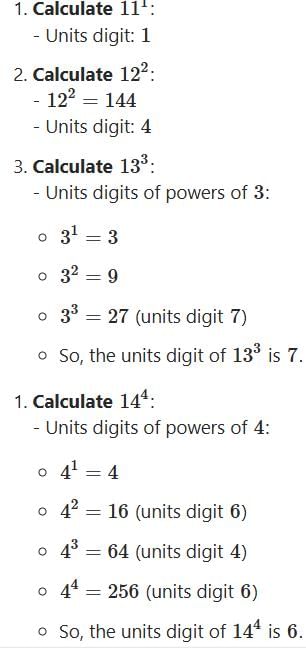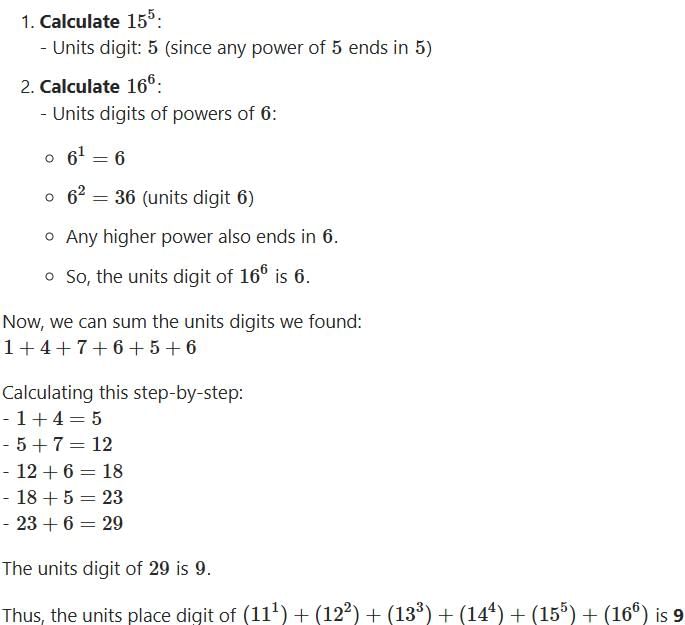This EduRev document offers 10 Multiple Choice Questions (MCQs) from the topic Number System (Level - 1). These questions are of Level - 1 difficulty and will assist you in the preparation of CAT & other MBA exams. You can practice/attempt these CAT Multiple Choice Questions (MCQs) and check the explanations for a better understanding of the topic.
Question for Practice Questions Level 1: Number System - 1
Try yourself:The last digit of the number obtained by multiplying the numbers 81 × 82 × 83 × 84 × 85 × 86 × 87 × 88 × 89 will be
Explanation
The units digit in this case would obviously be ‘0’ because the given expression has a pair of 2 and 5 in it’s prime factors.
Report a problem
Question for Practice Questions Level 1: Number System - 1
Try yourself:When we multiply a certain two-digit number by the sum of its digits, 405 is achieved. If you multiply the number written in reverse order of the same digits by the sum of the digits, we get 486. Find the number.
Explanation
The two numbers should be factors of 405. A factor search will yield the factors. (look only for 2 digit factors of 405 with sum of digits between 1 to 19).
Also 405 = 5 × 34. Hence: 15 × 27
45 × 9 are the only two options.
From these factors pairs only the second pair gives us the desired result.
i.e. Number × sum of digits = 405.
Hence, the answer is 45.
Report a problem
Question for Practice Questions Level 1: Number System - 1
Try yourself:The difference between two numbers is 48 and the difference between arithmetic mean and their geometric mean is 18. Then, the greater of two numbers is:
Explanation
Let the numbers be x and y.
So according to question,
x - y = 48
or (√x - √y)(√x + √y) = 48......eqn .1
arithmetic mean of x and y = (x + y)/2
and geometric mean of x and y = √(xy)
so according to question,
(x + y)/2 - √(xy) = 18
so x + y - 2√xy = 36
(√x - √y)² = 36
√x - √y = ±6.....eqn. 2
Putting eqn. 2 in eqn. 1
we get,
√x + √y = ±8....eqn.3
Adding eqn.2 and eqn.3,
√x + √y + √x - √y =14
2√x = 14
√x =7
So x = 7² = 49....eqn.4
As x - y = 48
y = x - 48 = 49 - 48 = 1.
Therefore x = 49 and y = 1
Report a problem
Question for Practice Questions Level 1: Number System - 1
Try yourself:If 381A is divisible by 9, find the value of smallest natural number A.
Explanation
For 381A to be divisible by 9, the sum of the digits 3 + 8 + 1 + A should be divisible by 9.
For that to happen A should be 6.
Option (d) is correct.
Report a problem
Question for Practice Questions Level 1: Number System - 1
Try yourself:Find the ratio between the LCM and HCF of 5, 15 and 20.
Explanation
LCM of 5, 15 and 20 = 60.
HCF of 5, 15 and 20 = 5.
The required ratio is 60:5 = 12:1
Report a problem
Question for Practice Questions Level 1: Number System - 1
Try yourself:If the number A is even, which of the following will be true?
Explanation
Only the first option can be verified to be true in this case.
If A is even, 3A would always be divisible by 6 as it would be divisible by both 2 and 3.
Options b and c can be seen to be incorrect by assuming the value of A as 4.
Report a problem
Question for Practice Questions Level 1: Number System - 1
Try yourself:A number 15B is divisible by 6. Which of these will be true about the positive integer B?
Explanation
For the number 15B to be divisible by 6, it must satisfy two conditions:
- Divisibility by 2: The number must be even.
- Divisibility by 3: The sum of its digits must be divisible by 3.
Since 15B represents a number with digits 1, 5, and B, let’s analyze each option for B:
- For divisibility by 2, B must be even (i.e., 0, 2, 4, 6, or 8) because an even B makes 15B an even number.
- For divisibility by 3, the sum 1+5+B=6+B must be divisible by 3.
Since 6 is already divisible by 3, any even B (0, 2, 4, 6, or 8) will keep the sum divisible by 3.
The correct answer is: (d) Both (a) and (c)
Also, value of B is divisible by 6. Therefore, both options are correct, B will be even and B will be divisible by 6.
Report a problem
Question for Practice Questions Level 1: Number System - 1
Try yourself:Find the units digit of the expression 256251 + 36528 + 7354.
Explanation
The units digit would be given by 5 + 6 + 9 (numbers ending in 5 and 6 would always end in 5 and 6 irrespective of the power and 354 will give a units digit equivalent to 34n+2 which would give us a unit digit of 32 i.e.9).
Report a problem
Question for Practice Questions Level 1: Number System - 1
Try yourself:Find the units digit of the expression 111 + 122 + 133 + 144 + 155 + 166.
Explanation
 \
\

Report a problem
Question for Practice Questions Level 1: Number System - 1
Try yourself:Find the number of zeroes at the end of 1090!
Explanation
The number of zeroes would be given by adding the quotients when we successively divide 1090 by 5 : 1090/5 + 218/5 + 43/5 + 8/5 = 218 + 43 + 8 + 1 = 270. Option (a) is correct.
Report a problem






 \
\



















